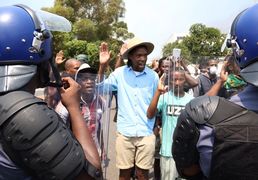SINCE Finance Minister Pravin Gordhan drew his pistol at the budget media briefing and made his fight with South African Revenue Service (SARS) commissioner Tom Moyane public by excluding him from the event, the talk of the town has been: who will win at high noon at the Corral?
It’s easy and tempting to say that because the markets can be depended on to react with shock and horror if Mr Gordhan resigned, he must surely be the winner.
Mr Gordhan might be difficult to fire right now, but it is still possible to ignore him. And, so far, President Jacob Zuma appears to be doing just that.
When Mr Gordhan met the top six African National Congress (ANC) officials on Monday to state his case of a complete breakdown in trust with Mr Moyane and to complain about intimidation by the Hawks, which on the eve of the budget sent him questions about the SARS investigation, he did not find a completely sympathetic audience.
We know Gwede Mantashe, from his press statement on Friday, backs Mr Gordhan and is on the warpath against Mr Moyane, given the veiled references to him as the leaker of information to the media in the statement.
We also have a strong idea, according to several insiders briefed on the meeting, that Zweli Mkhize, the most influential of all when it comes to persuading Mr Zuma, supports Mr Gordhan.
However, Mr Zuma, who has the sole authority to remove Mr Moyane, did not agree that he should be made to go or that the investigation into the SARS rogue unit should be stopped.
It’s no secret that this is a proxy war between Mr Gordhan, who presided over the establishment of SARS, and Mr Zuma.
In 2014, Mr Zuma appointed Mr Moyane, who since his arrival at SARS has set about dismantling Mr Gordhan’s old networks. This included exposing a secret "rogue" unit that targeted organised crime using intelligence-gathering methods and may also have targeted political figures. Its members were close associates of Mr Gordhan, with deep political ties going back to their common past in the ANC underground.
Since coming to SARS, Mr Moyane has made it clear: his political target is Mr Gordhan and those loyal to him; his mission is a shake-up that disassembles existing structures to put in place others.
Mr Moyane’s plans to do away with SARS’s large business unit provide one such example. This, Mr Gordhan and his supporters believe, is a strategy to move negotiations with big business over large tax settlements behind closed doors, with all manner of manipulation becoming possible.
So the standoff is not just about personalities, although these matter. The extent of Mr Moyane’s betrayal — he recently gave an undertaking to the Treasury, then headed by Nhlanhla Nene, to halt all further action over the rogue unit — is large. But it is equally the changes in SARS that Mr Moyane is implementing that worry Mr Gordhan and the Treasury. His colleagues are deadly serious that a working relationship with Mr Moyane is untenable.
The usual manner in which Mr Zuma deals with such a conflict is to pretend to wash his hands. He is content to allow institutions to become dysfunctional and paralysed by conflict when it does not suit him to intervene.
But will he be able to behave like that, this time? The threat of market reaction, which would have been the first line of argument a week ago, when the top six first met Mr Gordhan, doesn’t appear to have shaken Mr Zuma. A week later, he is unmoved. So are the Hawks, which are adamant the probe into the rogue unit continues. Reports of Mr Zuma’s political demise have always been greatly exaggerated. Commentators, in particular liberal ones and the media, have spoken wishfully of a recall for many months. While the recall of Mr Zuma is not on the cards yet — no one in the ANC really has the appetite for that right now — the ground is starting to shift, at last.
For the first time, Mr Zuma is seriously weakened. In a growing number of quarters in the ANC, there is a new-found appetite to bring Mr Zuma to heel and a growing conviction that his leadership is bad for the country and the party.
On Monday, Mr Zuma stood firm. But by Wednesday, ANC MPs — backed by the Treasury and the party — had come out, too. By Sunday, the South African Communist Party had joined the ranks of Mr Gordhan’s supporters, with the Congress of South African Trade Unions expected to follow soon.
It would be foolish to assume from this that Mr Zuma has lost his control of the ANC’s national executive committee — it remains his stronghold.
And the security establishment is also firmly behind him.
But it will be difficult for him and his closest supporters to ignore the noises of public support for Mr Gordhan, from the ANC and alliance structures more generally. These are voices they know will resonate deeply with what many citizens are thinking.
Mr Zuma might just be the one who will have to stand down.



























Change: 1.61%
Change: 1.50%
Change: 1.82%
Change: 0.74%
Change: 4.50%
Data supplied by Profile Data
Change: -0.27%
Change: 0.26%
Change: 1.61%
Change: 0.00%
Change: 0.35%
Data supplied by Profile Data
Change: -0.33%
Change: -0.30%
Change: -0.40%
Change: 0.07%
Change: -0.23%
Data supplied by Profile Data
Change: 1.58%
Change: 1.07%
Change: 1.14%
Change: 3.88%
Change: -0.03%
Data supplied by Profile Data